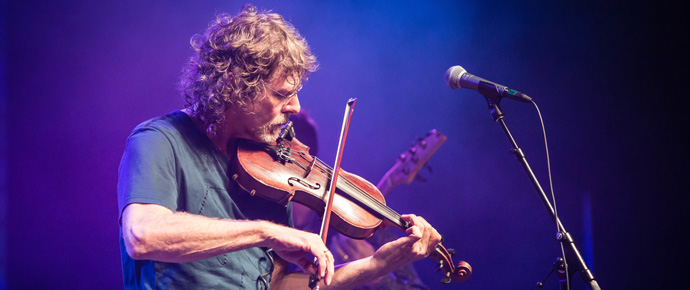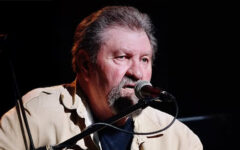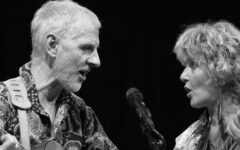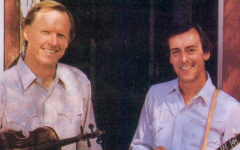
Sam Bush – photo by Shelly Swanger
Fifty years ago this month, in Louisville, KY, 19-year-old Sam Bush joined the Bluegrass Alliance as a guitar player.
It was the first step on a journey that led to an 18-year run with New Grass Revival, one of this year’s inductees into the International Bluegrass Music Hall of Fame, and to an ongoing run fronting the Sam Bush Band.
I caught up with Sam the other day and found him in an expansive mood.
“I don’t want this to come off as too egotistical, but it was my band and I loved it,” said Bush, the only member of New Grass Revival throughout its full 18-year tenure. “I can look back with great pride on the different versions and all of the different things we tried in terms of actual progressive things and be proud of it.”
He added, “The entire 18 years, I was having the time of my life. We were playing and doing exactly what we wanted to do. How many people get to earn a living doing that?”
But Bush is ready to leave the band in the past. There will be no reunion for the induction ceremony in September, and nothing planned for the future, when the COVID restrictions are merely bad memories, and festivals and shows are once again taking place.
“There’s no performance scheduled (at IBMA) and none planned,” there or anywhere else, he said. “Those days are over.”
He’s not bitter, he’s just moved on. “No one has more love or respect for New Grass Revival than me,” he said. There were some tensions, he said, as there are in any band. “But when I look back now, my selective memory remembers more of the good things.”
The band that helped breathe new life into bluegrass, and became the poster boys for progressive bluegrass, was born of necessity.
Bush, Curtis Burch, Courtney Johnson, and Ebo Walker teamed up in 1971, joining the Bluegrass Alliance with co-founder Lonnie Peerce, but there was trouble almost from the start. The four others wanted to fire Peerce. “He just wasn’t very good,” Bush said with his characteristic bluntness. But whatever he lacked in musicianship, he made up for in business savvy. Peerce owned the name of the band, so the other members needed to start over with a new name.
It wasn’t an easy transition. At some shows, the band’s edge of the envelope style of bluegrass fused with rock, jazz, and a smattering of just about everything else, was greeted by what Bush and others call the chairsnappers. They didn’t just get up and leave. They snapped their seats against the chair backs to nosily announce their departure and their displeasure.
And Peerce didn’t help matters as the new band sought bookings on the festival circuit, badmouthing them to Bill Monroe and anyone else who would listen.
“Carlton Haney booked us,” Bush recalled. “Bill Monroe didn’t.” In Bush’s recounting, Peerce told Monroe to stay away from the band, “because we sold drugs to school kids.” Not true, Bush said, but it put Monroe on the spot. He didn’t hire the band, but he stated publicly that he just didn’t want long-hair bands at his festival. But he did give the boys Body and Soul to record, Bush said.
Bush’s version of the relationship with Peerce will go unchallenged. Peerce and Monroe both died in 1996.
In the interview, Bush said New Grass Revival and Monroe were both pioneers. “He made his own music, too,” he said. “I guarantee he had to fight way more than we did to become accepted.”
All of the original members came from bluegrass backgrounds and always gave credit to the originators. Bush said NGR members would say, “If you like what we did, you should go back and listen to the original bands.”
NGR had two major iterations, with the original foursome together for about nine years, and the version with Béla Fleck and Pat Flynn on board for the final nine years, with John Cowan overlapping and Butch Robins playing for a spell, along with several others.
Robins brought the band one of its first big breaks, convincing Leon Russell to use NGR as an opener on a long tour that many fans still recall fondly.
But when Bush talked about the band on this particular day, he reserved most of his praise for Cowan and his big R&B voice that eventually landed him on stage with the Doobie Brothers.
“With John, we had a big voice that could make people shut up and listen in a loud, crowded bar,” he said, adding that learning to sing with Cowan made Bush a better vocalist.
Bush said the pending induction “is a great spiritual lift for the band, all of us.”
Since the announcement in late June, Bush has been listening back to NGR records and taped shows. He rapidly reached a conclusion, especially after listening to the early years:
“I was the worst guy in the band.”
These days, Bush is focusing on his work with the Sam band, and looking forward to the day when live shows will again be the norm. He doesn’t expect that to be any time soon.
“We’re being careful,” he said, “very COVID aware. I can’t wait, but we’re being patient. We all know who the oldest guy on the bus is.”







